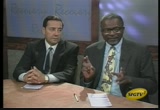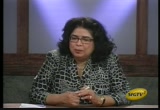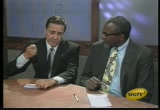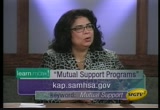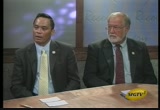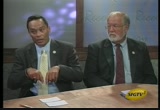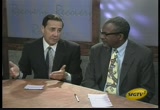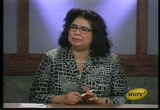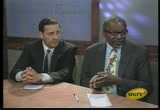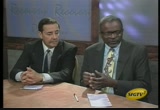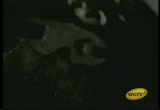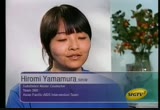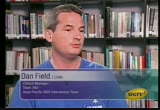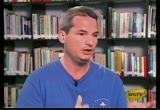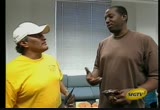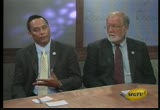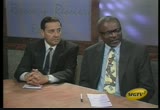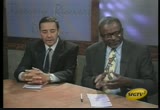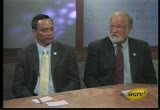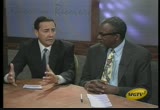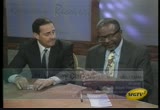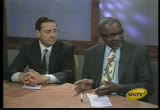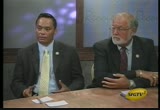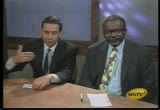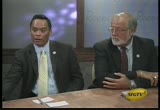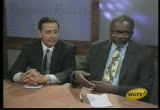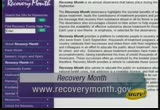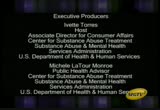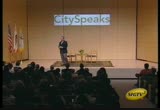tv [untitled] September 5, 2010 7:30pm-8:00pm PST
8:30 pm
doomed by god is also age. as you get older, your body responds differently and what we're finding epidemiologically is that we've got a whole cohort of baby boomers who are flirting with marijuana, prescription drugs and other substances, misuse of alcohol, because they still think they are 25. and they have disposable incomes. and they have the disposable incomes associated with that. so we're finding then this uptick in use of marijuana and other substances. so we need to have treatment programs and providers and people who are recovery facilitators understanding that you are dealing with an older population, as well as, you've got to deal not only with young people, adolescents and young adults, but you're now dealing with baby boomers who are entering a seniority. that is an important part. and then when you look at it from a cultural
8:31 pm
point of view, particularly in cultures where age commands respect, the person who has the alcohol or drug problem is in a conundrum. because they are an elder, if you're dealing with a tribal context, they are someone who is experienced or who is seen by younger people as a person of great respect, and yet they are struggling with their own alcohol and drug problem. when we're talking about at-risk behavior, we know that it exists among the- and is prevalent among the general population. but when it comes to special populations, it's almost something that people really don't stop to address as much. you know because it's- there's a certain amount- and particularly you mentioned the seniors, there's a certain amount of more freedom now to start dating again, and so i suspect that there's a lot of hiv worries. because hiv, even though we think that it's been taken care of, i think it's showing its ugly head again.
8:32 pm
you know, our treatment approach we took, we take the public health approach which the only person, not only been looking into addiction, but what is still the conditions it might bring, especially with the hispanic population. the socioeconomic part plays a major role because people who have been in addiction haven't seen the doctor for years. so you know, primary care health is a big issue with us. when they are doing recovery and they find out- oh, my gosh, i haven't seen my doctor, now i'm scared to see what else is the condition i have. so it's important to address, it's important to address not only, you know, from the addiction perspective, but also the primary health and health education, all areas of life. because recovery means that you are changing behaviors in all areas of your personal life.
8:33 pm
and i'm glad you mentioned recovery. faces and voices for recovery provides an individual an opportunity to join others and to figure out ways to support each other and to sustain recovery. and we haven't gotten to the fact that once we do get a person to go into recovery, that there is also a need for either a mutual support group or some other type of activities. within the context of ethnic and racial and other special populations, what is important to keep in mind in terms of a person that is in recovery in order for them to sustain their recovery? well, in order to sustain recovery, as we all know, a mutual support network is vital. and from a tribal standpoint, it's community support. because unfortunately, with faces and voices, what we are striving to do is continue to battle the stigma of discrimination that people with an addiction continue to face.
8:34 pm
well, in indian country, it's almost twofold. you have still the struggling addict that is criminalized and when they get into recovery, if they have a mutual support network and the community embraces them and continues to nurture them on their recovering journey, they are successful. but it's important. i mean, you can go to- i'll use a personal example of myself. when i sat there and having been raised off the reservation, i had tried traditional 12-step meetings, counseling, inpatient, outpatient, something just wasn't working. because even though i would go into these 12-step meetings, i just did not feel a part. for whatever reason at that particular time, i did not feel a part. well, when i went to the reservation and got into a culturally specific recovery plan that taught
8:35 pm
me culture and tradition, something happened. but what basically saved my life was, like most tribes, historically, when one member is down, the whole tribe comes together. well, for my particular case when i was down, my immediate family that was in recovery came around me, as well as the community, and that is what saved me. we've kind of taken the community aspect to another level as well because so many of our clients are marginalized- they are hiv positive, they are in recovery, they are lesbian or gay. we decided to introduce into treatment the whole concept of advocacy, both self-advocacy, but also societal change advocacy. and it came to the fore last year when the state was cutting hiv services, some of our clients in treatment said you know, we'd like to start a letter-writing campaign to the governors and see if we can reverse this, because this is important to us.
8:36 pm
so we facilitated that. so we do advocacy, as well as treatment in stepping stone. well, one of the greatest things, and i think from the federal government perspective, has taken an approach not only that the treatment is one of the ingredients for recovery, so many doors for recovery. and creating an ecosystem in our communities, making responsible communities that, you know, recovery is important and that the person who is in recovery to feel part of the ecosystem, the community. and that is a great thing. i think now the emphasis is not only treatment is important, but what happens after treatment. and that is the federal government, one of the blessings that they have done. but i think we need to disseminate to state government, it's still not happening. they are paying for treatment, but what happens after treatment? they are not paying for the recovery. they are not paying for recovery. they don't see the outcomes. and i don't think they- paying, but i think
8:37 pm
we have to create this ecosystem in our community, make them part of, the community is responsible for the individual to support and to access all of the areas they need. well, marco, i know you are very good because i have been to chicago to some of the recovery month events and they are very well attended. you know, you get almost 200 people in a room to recognize those that have graduated and those that have been in recovery for many, many years. and it's growing. actually, the last time, we were probably 3 years ago now, we have about 500 people who celebrate in terms of acknowledging their recovery and the years. and we do the walk also recovery, a whole bunch of organizations, we get together and things like that. but dr. clark, i think it has to go beyond the recovery month. i mean, recovery month is fantastic and we certainly support it, but really what do ethnic, racial, and special populations need to be cognizant of
8:38 pm
that maybe they are not yet? well i think, as with any population, what we're trying to foster is this understanding that we're dealing with powerfully reinforcing psychoactive substances when we talk about the misuse of alcohol, when we talk about the use of methamphetamine, cocaine, heroin, or prescription drugs. and that the person who is at risk is anybody in the community. so from a prevention point of view, you understand that and from a recovery oriented point of view, it's not just the individual who is the beneficiary, that individual's family is very important. especially when you're dealing with racial and ethnic groups, family becomes very important. so the family benefits and then the community as a whole, as william was pointing out, the community not only contributes to the recovery of the individual who has the alcohol and drug problem, but the community benefits from that because with regard to the substance use,
8:39 pm
that person who is now in recovery can give back. it can function as a role model for young people, young adults, adolescents who are struggling with alcohol and drugs and the pressure to use alcohol or drugs. and that person is able to give back and then rallies around. so the cultural dynamic is very, very important. so recovery as a cultural motif is- i like the whole notion of the recovery ecosystem, the recovery-oriented environment which allows everyone to participate. not just the person who has the alcohol and drug problem, but that person's family and that person's community because the beneficiaries go well beyond the individual. and when we come back, we're going to continue to chat about this. i'm going to come back to you, william. and we're also going to get into- you mentioned something very interesting that i think we need to cover, it's the whole issue of prevention. we'll be right back. for more information on national alcohol and drug addiction recovery month, events in your town and
8:40 pm
how you can get involved, visit the recovery month web site at recoverymonth.gov. people trapped by drug or alcohol addiction often feel like there's no hope, no way out. but for every lock, there's a key. and if you have a problem, it's good to know there are real solutions to help you get free. for drug or alcohol treatment referral for you or someone you know, call 1-800-662-help brought to you by the u.s. department of health and human services. [music] our program is multifaceted.
8:41 pm
it incorporates both group treatment and individual treatment for asian and pacific islanders who are struggling with chemical dependency. we use incentives to keep people motivated in treatment and we use both sort of informal and formal interventions. i like the diversity of the clientele that we get here at team 360. regardless of ethnicity, each of their stories is so different from the next. but for some reason, when they come into group, they support each other and they know how to- there's just this warmth and this support, even though they are so different. it's just a very comfortable place to be at and i think there's a lot of open-minded individuals. so like if i come in, they are not going to be like look at that drug addict. just like the opposite, they are like out here willing to help you out. the challenge and the rewards of what i do in
8:42 pm
recovery is that i get to see individuals really improve their lives, not only in their recovery, but focus on their everyday stressors, and they are able to cope with it in a much better improved way. our program is based on the matrix model intervention, which uses cognitive behavioral tools. so we talk a lot about how thinking affects feeling and behavior and we challenge negative, cognitive distortions that lead to emotional symptoms that lead often to use. i look at it like this: using drugs is going the wrong way on a wrong way street, a one-way street. the further you go, when you make that u turn, it's going to be further to come back. so the sooner you realize, it's less you have to come back. we are very strong in our advocacy for our clients to avoid the people and places that lead to
8:43 pm
dangerous situations that can lead to use. and that's one of the things we celebrate as well. if someone recognized what their trigger was and they didn't use when in the past they might have used in that situation, we publicly recognize that in our group setting. with the asian pacific islander, there is stigma that has to do with substance use and mental health issues and just getting people in the door to come to group is a big step for a lot of them. and that's why i feel really proud that our staff is very sensitive to this and there's no shaming in group and we have a very positive supportive environment. because, you know, we're a community that, it's all about saving face. so if you have a problem, you know, whether it's substance abuse or maybe getting mental health treatment, you're supposed to just deal with it by yourself, you're not supposed to go outside of your family, you're not supposed to talk about your problems.
8:44 pm
being able to educate our clients on how confidentiality works and how they will be protected through it has been a very important piece of this, of what we do. i think that the glue of team 360 is the feeling of trust and support that is generated within the groups. our staff is very caring and we are committed to this issue and we don't shame our clients at any time, we support them in their positive life change and we celebrate their life changes. william, you know, so far we've been talking about very specialized programs that deal with special populations. any examples that you can bring forward of mainstream service providers that have dealt with issues related to native country addiction issues? well, mainstream providers, the one that really comes to mind is the white bison organization
8:45 pm
and the wellbriety movement. they started out as an original rcsp program and they developed into basically the number one culturally sensitive program that is showing great promise in indian country. it's beginning to take hold on my reservation. it seems to be taking even quicker hold out west. because as each tribe is different, culture out west is completely different than the tribal nations that are on the east coast. so the white bison organization seems to be the one that is working the best. and dr. clark, i know that in csat, for example, a lot of special population clients go to mainstream programs, to nonspecialized programs. what kind of success are we seeing with that?
8:46 pm
well, the issue of cultural competence is really the important discussion point here. we do find that programs that are run by american indians, alaska natives, for american indians, alaska natives or programs that target hispanics, run by hispanics, tend to produce better outcomes than programs that are not sensitive to those issues. so we use sort of a bias force paradigm. there are programs that are not run by the specific population group, but have modules that are targeted to the unique needs of that group. so they do not as well as the programs that are run by the specific population group, but they do better than programs that are general. so when we look at the outcomes of, say, a woman in a male program or a general program that doesn't have
8:47 pm
any gender specific programming, she doesn't do as well as the program that is targeted to, for women, run for women or a program that has gender-specific issues. the same thing for american indian, alaska natives, hispanics, african americans, and the same thing would be applicable to gay, lesbian, bisexual, and transgender. the key issue is of cultural competence and that is the thing that if indeed you know you've got a diverse population, you want your practitioners, your facilitators to be aware of some of these unique issues. and moving prior to the person even getting a problem as we address again the whole issue of prevention, are there some idiosyncrasies, going back to that word, of special populations that folks need to be aware of, you know, in terms of the viewership, in terms of what the types of programs that they get their messaging from. even the whole notion, as you were mentioning, john, of using the individuals that are in recovery to go
8:48 pm
out in the community, right? i think you were mentioning that. we have an amends part of our program where people make amends. that can commonly look like distributing bags of lunches to homeless populations. and that's when prevention comes in because that person receiving that lunch bag from one of our clients as part of their amends project is maybe talking to somebody that they knew on the street. and they are seeing that this person is in recovery and that it's possible and there's your prevention. also with our population, prevention has to take place in the bars, in the baths, in the clubs, and in the raves. it has to be out there in the community. so we are constantly talking about safe sex, need for treatment, need for precautions, and stepping stone becomes almost like an island of sobriety in the lgbt community that is kind of spreading out in a lot of different ways. you know, it is interesting because i truly believe that prevention needs to be focused
8:49 pm
communities by communities, block by block. and no matter who lives in the block- but coalitions are so crucial for us to disseminate in terms of underage drinking and the prevention. give us an example, marco, of how block by block manifests itself in the latino community? so we have a coalition- actually, it's paid by the csap, the prevention, federal government in which we focus the underage drinking. so we have formed a coalition and the ecosystem becomes a part- the schools, police, community organizations, banks, everybody is involved in that and we bring together. and interesting, we hire moms to policing, if you want to say, patrol, there's a patrol, policing- so the moms are- the moms are working with us in terms of making sure that the crowds, the street, they go to school. and it's so active, involved, the community,
8:50 pm
that they are feeling like they are contributing and besides they are making a little money for their families. so i truly believe, you know, this notion of coalition and being involved in community, block clubs, can promulgate, disseminate the importance of prevention, especially in the substance abuse. and i'd like to stress, as an add on, not only are you doing block by block by having the representatives, members of the families in the community, but also the religious community, the faith community. and the african-american community, i suspect, that's critical- that plays a major role. so you want to reach out to the pastors, you want to reach out to the reverends. but not just in the african-american community, because your religious leaders in any other community, whether it's buddhist or sikh or jewish or muslim, you really want the religious leaders to understand that nobody escapes alcohol and drugs. the majority of your congregation may be alcohol and
8:51 pm
drug free, but there are people in your congregation who are not, and it's an issue, just as we're talking about. so using community coalitions, outreach in the faith community regardless of your religious orientation makes it clear that alcohol and drugs are a problem and that recovery from them can occur and that prevention is an important message. because we find silence- when we look at our household survey data, when people stop viewing a particular drug as a potential threat to the community, that drug becomes a threat to the community. that's bizarre, but that's what happens. we stop thinking of it as a potential threat and it becomes a threat. so we need to make sure that the whole community embraces that ecosystem that marco was talking about. that's the issue. we have a recovery-oriented environment which starts with community coalitions recognizing that
8:52 pm
alcohol and drugs are a problem and then move toward the treatment community and then to the recovery environment. and i just wanted to add something real quick. within the native american communities, in order for recovery to really take hold, because alcohol as an addiction is real prevalent among our people, the community has to heal from within. you can have an army of sources coming from the outside, but unless the community is vested in it and heals itself, whatever you do will be moot. and i think increasingly, going back to national alcohol and drug addiction recovery month, the fact that individuals are more increasingly coming forward and telling their stories and talking about their own recovery- i think- and paying back, as you were saying, they can not only be used to help people create a peer support,
8:53 pm
but also to create a sense within that community block to help prevent other folks from having to deal with this issue. role models have to come from the community. it's not for a super star, it has to be seen as real, your neighbor, your father, your uncle. and it's so crucial because sometimes we think the role model should be the basketball star and they are so untouchable that they can't relate it. but if we create these role models in terms of your family, your teacher, your pastor, that will be very successful in terms of disseminating. and kids look up to the role models that we have created in our communities. and that's why drug courts are very important - alternatives to incarceration, they are very important.
8:54 pm
the cherokee drug court, what happens is when you have a graduate, they come back and become a mentor to the rest of the defendants. and being in a small community like my reservation, chances are they used together. so when the one that is new into the court sees their party buddy being clean and sober, working a good job, clean, it works. they go how did you do it? well, i'll tell you about it, this is how i did it. and it's sort of like that peer networking. dr. clark, you wanted to add something? yes, and that becomes important. the criminal justice system, law enforcement, the judges, we need to see them as an integral part of the community ethos and the mores of the community so that we get all aspects of the community working together in harmony, that ecosystem again. because if the community is not safe, then you'll
8:55 pm
find attitudes in the community are really negative toward the individuals in the community who have a alcohol and drug problem. so we want to make sure that it's not only a good public health message, but a good public safety message. and the drug courts are a good model for achieving that, demonstrating that an individual who has a alcohol and drug problem who may have violated the law, but who is nonviolent, can restructure their lives in a way that benefits not only themselves, but their family and the larger community. and a good model for the entire community to support those in recovery is national alcohol and drug addiction recovery month celebrated every september. we encourage you to get engaged, get involved, conduct events, and look specifically in your community for those individuals that are in recovery, that are giving back to their community, giving back to their families. we want you to laud them and applaud them because
8:56 pm
they have done a tremendous amount of work to get where they are and to overcome addiction. i want to thank you for being here, it was a great show. [music] for a copy of this program or other programs in the "road to recovery" series, call samhsa at 1-800-662-help or order online at recoverymonth.gov and click multimedia. [music] every september, national alcohol and drug addiction recovery month provides an opportunity for communities like yours to raise awareness of alcohol and drug use disorders and highlight the effectiveness of treatment. in order to help you plan events and activities in commemoration of this year's recovery month observance, the free recovery month kit offers ideas, materials, and tools for planning,
8:57 pm
organizing, and realizing an event or outreach campaign that matches your goals and resources. to obtain your copy of this year's recovery month kit and gain access to other free publications and materials related to addiction treatment and recovery issues, visit the recovery month web site at http://www.recoverymonth.gov/ or call 1-800-662-help. it's important that everyone become involved because addiction is our nation's number one health problem and treatment is our best tool to address it. [music]
8:59 pm
second installment of city eaks. it is a series of discussions on policy issues and pollutions affecting the city of san francisco. about a month and a half ago we had the discussion. we have 2 wonderful conversationalist and more details on their bios on your programs. by way of introduction, alice waters is the founder and owner of chez panisse restaurant in berkeley, california a
49 Views
IN COLLECTIONS
SFGTV2: San Francisco Government Television Television Archive
Television Archive  Television Archive News Search Service
Television Archive News Search Service 
Uploaded by TV Archive on

 Live Music Archive
Live Music Archive Librivox Free Audio
Librivox Free Audio Metropolitan Museum
Metropolitan Museum Cleveland Museum of Art
Cleveland Museum of Art Internet Arcade
Internet Arcade Console Living Room
Console Living Room Books to Borrow
Books to Borrow Open Library
Open Library TV News
TV News Understanding 9/11
Understanding 9/11